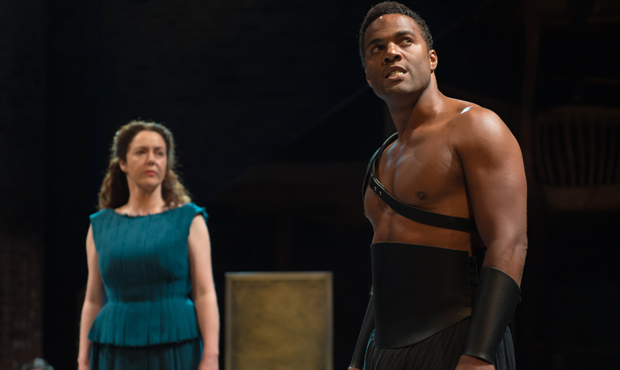Michael Coveney: Could men become the new minority in theatre?
Some of the greatest female roles in world drama are currently being re-defined

© Topher McGrillis
In a week when the RSC’s new Hecuba and the Almeida’s new Medea re-define two of the greatest female roles in world drama, and Sandi Toksvig announces her 2016 tour dates in the wake of claiming that her Women’s Equality Party is the fastest-growing new political alliance in Britain, Vanessa Redgrave gave an extraordinary interview in which she denied that she’d ever been a feminist.
"Women are different from men and that’s where women can be stupid, because they don’t acknowledge it," she told Alison Roberts in the Evening Standard…"we’re child-bearers primarily, and we are the weaker sex, and once we’ve given birth to children our life is of necessity bound to them. I wouldn’t advocate it being any other way."
Well, I suppose Sandi can stick that in her pipe and smoke it. But Redgrave’s remarks have a special force as we contemplate the monstrous, unnatural maternal instincts of Hecuba and Medea – Redgrave was herself a spectacularly tormented and moving Hecuba for the RSC in 2005; her first daughter, Natasha Richardson, died in a skiing accident six years ago and she herself suffered a serious heart attack in April, it now emerges. But her flame is undimmed, and she continues to campaign for human rights.
In many ways Redgrave – a dynastic and tragic figure like many Greek drama heroines – is the soul of our theatre, even if you blanch a little at some of her views. But unlike Medea and Hecuba, she does not kill children. In fact, nor does Hecuba in Marina Carr‘s new RSC version, a distortion she puts down to believing that Euripides’s character wouldn’t do such a thing.
You might argue that, well, his character actually does, and it’s her job to make that work in the translation, not pander to her own decent 21st century Irish sensibility. But that would be unfair. Carr’s Hecuba is so far removed from Euripides in so many respects (she sleeps with her oppressor, Agamemnon, for a start) as to constitute her own valid re-casting of the myth. Personally, I’d rather see the genuine Euripides (especially as performed by both Redgrave and Claire Higgins), but Carr’s is a beautiful, technically adventurous text – characters speak to each other and in the third person about themselves – and there’s a stark, fierce, classic performance by Derbhle Crotty in Erica Whyman‘s production to match it.
' Redgrave’s remarks have a special force as we contemplate the monstrous, unnatural maternal instincts of Hecuba and Medea.'
At the Almeida, the translator of Medea, novelist Rachel Cusk, has outlined a more complex and interesting response to the mother/killer syndrome, suggesting that the children have become a manifestation of her faithless husband’s abuse and use of her; that husband believes he has got away with it by entrusting her with the children. So she kills them. It will be interesting to see in the performance how these theories have informed the acting, especially that of Kate Fleetwood as Medea – directed, incidentally, by her husband, Rupert Goold, with whom she has two children. Let’s just hope the kids are safe home with the baby-sitter on opening night.
One of Glenda Jackson‘s last performances before she became an MP (she stood down at the election last May) was Racine’s Phaedra, overwhelmed by an incestuous passion for her own husband’s son. On resuming her first career, in a radio adaptation of Emile Zola’s Les Rougon-Macquart, she told the Observer that nothing had changed, and that all the best parts were still written for men. "There are major roles for women in Greek drama but they tend always to be tragic and they’re always losers."
A similar frustration has boiled over in Denise Gough, who has become an overnight sensation at the National Theatre with her performance in Duncan MacMillan’s People, Place and Things as an actress whose life is in tatters because of an addiction to drink and drugs. "I’ve spent the past fifteen years hustling for work and waiting to be picked," she told the Sunday Times in a magazine cover story. "Now I’ve got the job of a lifetime and I’m just going to f***ing love it." These are fighting words, and it’s no accident, surely, that they come as Sarah Waters’s Tipping the Velvet, charting the lesbian love story of a Whitstable oyster girl and her music hall paramour is adapted for the Lyric, Hammersmith, by Laura Wade, or that Sonia Friedman‘s production team on Mark Rylance‘s triumphant Farinelli and the King at the Duke of York’s (written by his wife, Claire van Kampen) is comprised almost exclusively of women. Are we really on the cusp of a tectonic shift in the theatre where men become the new minority?












